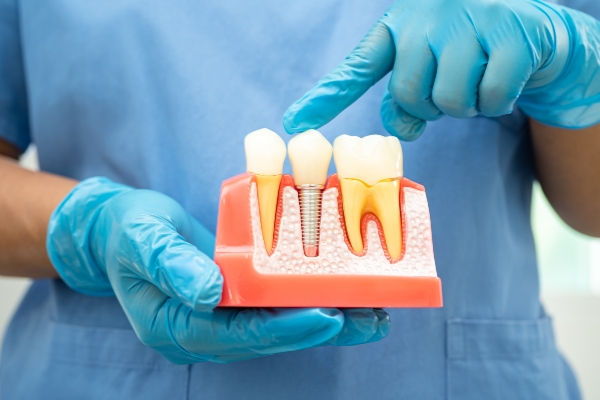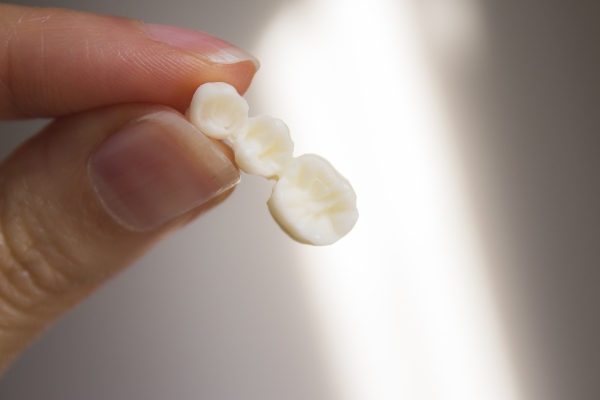 Dental implants are small titanium posts surgically implanted in the jawbone and act as artificial tooth roots. Dentists can use these posts to support replacement teeth such as crowns, dentures, or bridges, restoring the appearance and function of your smile. However, not all dental implants are created equal. There are several types of dental implants, all tailored to meet the specific needs and preferences of each patient.
Dental implants are small titanium posts surgically implanted in the jawbone and act as artificial tooth roots. Dentists can use these posts to support replacement teeth such as crowns, dentures, or bridges, restoring the appearance and function of your smile. However, not all dental implants are created equal. There are several types of dental implants, all tailored to meet the specific needs and preferences of each patient.
Endosteal implants
Endosteal implants are the most common type of dental implant. They are surgically placed directly into the jawbone, providing a stable foundation for replacement teeth. Endosteal implants, typically made of titanium or other biocompatible materials, integrate with the patient's jawbone through a healing process known as osseointegration.
After the implant fuses with the jawbone, which can take up to six months, the patient returns to our dental office for a second procedure. The dentist will expose enough of the abutment to attach an artificial replacement tooth like a dental crown. For endosteal implants, patients typically need to be in good overall health and have enough bone density in their jawbone to support the implant and replacement tooth.
Subperiosteal implants
Subperiosteal implants offer a less risky alternative to traditional endosteal implants. This type of dental implant can help patients with insufficient bone density or who cannot undergo bone grafting procedures. Unlike endosteal implants, subperiosteal implants are placed on top of the jawbone but beneath the gum tissue. A metal framework is customized to fit the shape of the jawbone, providing support for the replacement teeth.
While less commonly used and less durable than endosteal implants, subperiosteal implants can be an effective solution for certain individuals with shallow jawbones and cannot support a dental implant. Additionally, they only require a single surgical procedure to install the implant and the replacement tooth. This makes them ideal for those who cannot or do not want to undergo more than one surgery to complete their treatment.
Zygomatic implants
Zygomatic implants are the least common type of dental implant. This technique is often reserved for those who have experienced significant bone loss in their upper jaw, particularly in the maxillary sinus area. Instead of the dentist anchoring the implant directly in the jawbone, they anchor the zygomatic implants in the patient's zygomatic bone (cheekbone), providing the necessary stability and support for a dental restoration. Zynmoatic implants bypass the need for bone grafting procedures and expedite the treatment process for some patients.
Mini dental implants
Mini implants, or small-diameter implants, are a smaller alternative to traditional dental implants. Since their diameter is less than 3 millimeters - about the size of a toothpick - they are suitable for patients with limited bone structure or seeking a less invasive treatment option. Mini implants can support crowns, bridges, or dentures, providing stability and retention without the need for extensive oral surgery.
All-on-4 dental implants
All-on-4 dental implants are a viable option for patients who have lost most or all of their teeth in a single arch and do not want to wear removable dentures. During this procedure, the dentist will strategically place four implants in different parts of a lower or upper arch to support a full arch of replacement teeth. This technique utilizes available bone tissue and minimizes the need for bone grafting. All-on-4 dental implants are also an efficient and cost-effective option for those who need full-mouth rehabilitation.
Implant-supported dentures
An implant-supported denture is a type of overdenture that replaces multiple teeth. Like All-on-4 implants, implant-supported dentures can replace most or all of a patient's teeth in a single arch. It will need at least two dental implants for support and often requires at least six for the best result. Implant-supported dentures can be removable or fixed.
Removable
Attaches to dental implants in the patient's jawbone, staying firmly in place until the patient needs to remove the dentures for cleaning.
Fixed
Attaches permanently to dental implants in the patient's jawbone and can only be removed by a dentist for necessary care and maintenance.
Unlike traditional implants, implant-supported dentures do not shift or slip when one eats or speaks. They are also more comfortable and secure, providing a long-term tooth replacement solution.
What type of dental implant is right for you?
Choosing between the different types of dental implants can be difficult without the right information. If you have questions about which option is right for you, our team is here to help make the process as easy as possible. Call our office today to learn more about our options or schedule a consultation.
Request an appointment or call My Saratoga Dentist PLLC at 518-675-3094 for an appointment in our Saratoga Springs office.
Recent Posts
Dental implant restorations have transformed dentistry by offering a versatile and reliable solution for replacing missing teeth. This approach to smile restoration seamlessly combines durability and natural aesthetics, restoring oral function and appearance. Because implant restorations can support different types of dental prosthetics, they address a variety of needs while preserving oral health. Understanding the…
Approval for dental implants puts you one step closer to restoring a complete, healthy smile. Dental implants can restore both the appearance and functionality of a full set of teeth. This way, patients can enjoy a full set of teeth along with a smile they enjoy showing off. The process is somewhat lengthy, so knowing…
Wondering about dental implants? Read on to learn more. If you have experienced tooth loss and are exploring potential replacement options, then you have probably heard about dental implants. Dentists and patients are turning to tooth implants because it is provenly effective for replacing missing teeth. However, there are different implants, each of which is…


